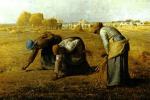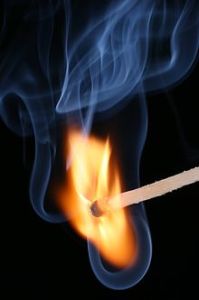Is owning land like owning a bowl or a blanket? Do human beings have the right to buy and sell land, inherit it, give it away, use it any way they like, destroy it?
This week’s Torah portion, Behar (“on a mountain”), lays out rules for land ownership in ancient Israel and Judah. The first rule is about farmland:
The seventh year will be a time of the most restful rest for the land, a time of rest for God. You shall not sow your field and you shall not prune your vineyard. (Leviticus/Vayikra 25:4)
Every seventh year, the Torah explains, everyone can eat what grows wild on your land:
It shall be … for yourself and for your male servant and for your female servant and for your hired laborer and for your toshav, the geirim with you; and for your cattle and for the wild beasts that are in your land; all may come to it to eat. (Leviticus 25:6-7)
toshav (תּוֹשָׁב) = resident alien, foreigner living in a citizen’s household. Plural = toshavim (תּוֹשָׁבִים).
geir (גֵּר) = resident alien, immigrant; non-citizen who moved from another land. Plural = geirim (גֵּירִים).
The implication is that although you own the land, you only own its produce six years out of seven. Every seventh year you must let it lie fallow,1 giving the land a year of rest (shabbat, שַׁבָּת), just as every seventh day you give everyone in your household a day of rest (shabbat, שַׁבָּת). During your land’s year of rest, whatever it produces is ownerless, and can be eaten by anyone, even wild animals. Additionally, landowners may neither sell nor hoard the produce during that year; like everyone else, they may pick up only what they can eat.
The next rule in the Torah portion Behar lays out what happens to land every 50th year. After the 49th year (which is a year of rest for the land, as above), all the land gets an additional year of rest, and during that year ownership of each parcel of land reverts to the family that owned it 50 years before—the descendants of the family that owned that land 50 years before that, and so on, all the way back to the original assignment of land in the book of Joshua.2
In this year of the yoveil, each of you shall return to his holding. (Leviticus 25:13)
yoveil (יוֹבֵל) = ram, ram’s horn, shofar; year of blowing the ram’s horn. (English “jubilee”.)
That means a plot of land may not be sold in the sense we sell land today. Instead, someone pays up-front to lease the land for however many years are left before the next yoveil. During those years, he3 may plant and harvest as he likes—but then he has to return the land.
According to the count of years since the yoveil, you shall purchase it from your fellow; … since he is selling you the number of harvests. (Leviticus 25:15, 16.)
Does that mean that the only true owners are the “original” families that were given land when the Israelites conquered Canaan, and get the same lands back every 50 years? No. The Torah says that all land belongs to God.
You may not forfeit the right to reacquire the land, because the land is Mine; for you are geirim and toshavim with Me. (Leviticus/Vayikra 25:23)
God is the true landowner of the land; even the Israelites who inherit land, or get it back in a yoveil year, are resident aliens from God’s point of view.
If everyone who “owns” land is actually borrowing it from God, everyone must obey God’s rules about the use of the land. Besides letting the ground rest every seven years, they must leave some of the harvest in the field for poor people and geirim to glean.4
*
In modern nations today, our own governments can seize private land by eminent domain, often (depending on the nation) compensating the owners for their loss. In general, people can buy, sell, inherit, and give away land, but there are limits—set by government rather than God—on how they can use the land. We have zoning laws, laws protecting wetlands, laws requiring large developers to set aside some land for public parks or green spaces.
But we could do better, if our governments were truly dedicated to the public good. For example, we could have laws banning the use, on farms and on homeowners’ lawns, of any pesticides, herbicides, or fertilizers that poison the environment. We could have laws severely limiting carbon dioxide emissions, and all forms of air and water pollution.
After all, does anyone have the right to degrade our God-given earth?
All human beings are merely temporary residents, geirim and toshavim, on God’s land. We live here on sufferance. We depend on nature, which some people call God’s creation—because it certainly isn’t ours. If only we could remember that we are all gleaners, harvesting our food from land that does not really belong to us!
We need to wake up and hear the ram’s horn!
(An earlier version of this essay was published in May 2010.)
—
1 The seventh year is called the year of shmittah (שְׁמִטָּה), “release”, in Deuteronomy 15:1-14, where it is described as the year for remission of debts and the freeing of Hebrew slaves.
2 Joshua 13:8-33 confirms Moses’ assignment of land east of the Jordan River to the tribes of Reuben and Gad, and half of the tribe of Menashe, divided by their clans. Joshua 15:1-17:18 confirms the assignment of land the tribes of Judah, Efrayim, and the other half of Menashe have already taken by conquest west of the Jordan, divided by their clans. Joshua 18:1-19:48 describes the assignment of land by lottery (which was presumed to be the will of God) to the remaining seven tribes and their clans. (The Levites, who serve at the temple instead of farming, are given land only in towns, with small attached pastures.) In the next few books of the Bible, the tribes do not conquer all of these assigned lands, and the tribe of Dan moves to another area.
3 Society in the ancient kingdoms of Israel and Judah was patriarchal, giving the male head of household authority over everyone else. According to current scholarship, the book of Leviticus was written sometime after the Assyrian Empire captured the northern kingdom of Israel in 721 B.C.E., but the patriarchal system continued in Judah. Women could inherit land only when their fathers died without a son, as in Numbers 27:1-11, and even then strings were attached (Numbers 36:2-12).
4 Leviticus 19:9-10, 23:22; Deuteronomy 24:19-21.




